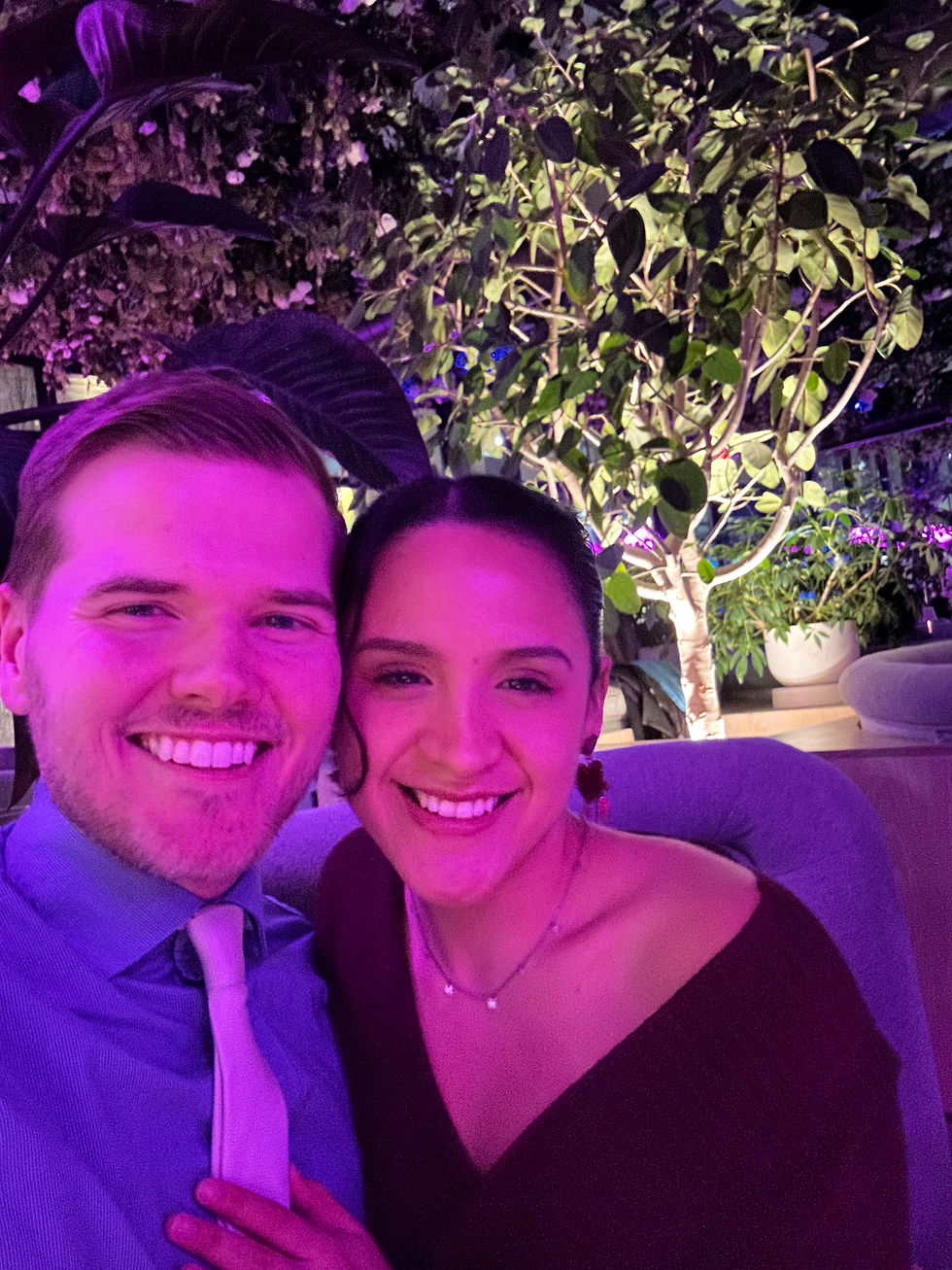How To Talk to Your Partner About Money
- Fernanda Alayo
- Feb 14
- 4 min read
Happy Valentine’s Day weekend, dear friends! ❤️
In the spirit of February—the month of love—let’s talk about something essential: money and love. We invite you to say “yes” to what we’re calling The Money Date!
We all know finances matter, yet many of us overlook the benefits of discussing them openly. Throughout your relationship, you’ll encounter countless “Who’s picking up the check?” moments—small but significant opportunities to build financial understanding together.

The Benefits of Talking to Your Partner About Money
Couples who regularly talk about money experience less stress and greater happiness. A 2023 study published in the Journal of Financial Psychology found that couples who discuss finances at least once per week tend to have stronger relationships (Donelly et al., 2023). Setting aside time for Money Dates fosters:
Mutual understanding
Mutual understanding
Shared goals
Financial accountability
Collaborative decision-making
That said, money can be an emotional and sensitive subject. Everyone has unique experiences and beliefs tied to it. No two people are always on the same page about finances—after all, everyone learns about money differently. For some, money represents security or freedom. For others, it might stir feelings of anxiety or even shame. (Wespath Institutional Investments, 2024).
Fear of judgment: Self-worth is often tied to financial worth, leading to shame or worries about being seen as lazy, irresponsible, or a poor money manager
Fear of conflict: Money talks can feel like they’ll lead to disagreements
Perceived lack of time: Busy schedules can push these important conversations aside
To have productive money conversations, you need to understand your own relationship with money through the Three Pillars framework. This model outlines three dimensions of money that shape our financial behaviors and relationships (Journal of Financial Planning, 2001)
Acquiring Money: Reflect on how you earn and what drives you—security, freedom, status, or something else. Ask yourself: How much money feels “enough”? What beliefs do I hold about earning, such as “hard work equals success” or “money is luck-driven”?
Spending Money: Do your spending habits align with your values and goals, or are they influenced by emotions, impulses, or external pressures?
Managing Money: Assess how you plan and organize your finances—budgeting, saving, investing, and tackling debt. Are you proactive or reactive with financial challenges?
Financial therapists say, “Knowing your and your partner’s relationship with money is half the battle” (Wespath Institutional Investments, 2024)
Money doesn’t have to be a taboo topic! By creating space for open, honest, and compassionate conversations, you and your partner can strengthen your bond. Make it a date, make it fun, and most importantly—make it yours.
The first step? Pick a date and put it on the calendar! Just like you prioritize doctor’s appointments for your health, this is just as important. It’s your relationship, marriage, and money—it doesn’t get any more serious than that!
In the early stages
According to Ellevest Magazine (2024), in the early stages of a relationship, it’s essential to focus on exploring if your financial values align, rather than diving into specific financial goals right away. You may find yourselves at different stages—one person could be paying off debt, while the other is saving for something big, building a trust fund, or planning for retirement—and that's okay. It's important to establish a strong foundation based on mutual understanding and respect for each other's financial approach.
Ellevest Magazine (2024) suggests that early financial conversations should be light and easy. One of the first money questions that often comes up on a date is: Who pays? To clarify this, you might say something like, “My treat!” or frame your invite as, “I’d like to take you to dinner” rather than “Want to grab dinner sometime?” These simple adjustments can prevent any awkwardness and set a positive tone for future conversations.
When discussing finances on a date, keep it casual and fun with questions like:
“Are you saving up for anything fun?”
“Where do you want to travel next?”
As you continue to talk more and dive deeper, Cristine Mui with CNBC (2024) suggests keeping financial conversations short and intentional—about 45 minutes max
Keep conversations focused and brief—about 45 minutes to an hour max, unless you both agree to go longer.
Space out sessions by a few days to build trust and show that you don’t need to tackle everything at once.
Avoid overusing the word “money.” Instead, address the emotions tied to it. For instance, “I’m stressed about money” might mean, “I’m worried I’ve made a mistake” or “I’m afraid I’m not good enough.”
Listen actively. Many of us talk 80% of the time and listen just 20%. Flip that ratio to encourage meaningful dialogue.
What Comes Next
Consistency is key. Choose tools that work for both of you. It can be a pen and paper (a personal favorite!), a shared spreadsheet, or a budgeting app you both enjoy. Keeping it regular and working as a team can turn these talks into one of the best parts of your relationship.
So, lovebirds, will you say “yes” to the Money Date?
Wishing you a Valentine’s weekend filled with love and meaningful connections. ❤️
XoXo,
Midwest Mujeres Co.
Fernanda Alayo (Blogger)
References
Gallo, E., (2001, May) Understanding Our Relationship with Money. Journal of Financial Planning.
Donelly, G., Garcia-Rada, X., Olson, J., Nikolova, H., Norton, M. (2023) Couples Underestimate The Benefits Of Talking About Money. Technical Report, 1-23. https://cepr.org/system/files/2023-07/Couples%20Underestimate%20the%20Benefits%20of%20Talking%20About%20Money%20-%20E.%20Donnelly%20Ximena%20Garcia-Rada%20Jenny%20G.%20Olson%20Hristina%20Nikolova%20Michael%20I.%20Norton_0.pdf.
Wespath Institutional Investments. (2025, February). Understand Your Relationship With Money. https://www.wespath.org/health-well-being/health-well-being-resources/financial-well-being/understand-your-relationship-with-money
Krawcheck, S. (2024, February). How To Talk About Money When You’re Dating. Ellevest Magazine. https://www.ellevest.com/magazine/family-relationships/money-talk-relationship-finances
Muis, C. (2024, December). 4 Tips For Talking With Your Partner About Money. https://www.cnbc.com/select/how-talk-your-partner-about-money/


Comments